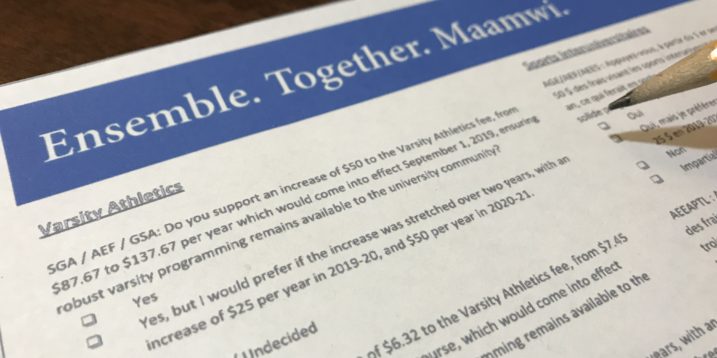by MacKenzie MacDonald
On November 2, the results of student votes in Laurentian’s referendum to increase student’s Compulsory Ancillary Fees came through, with only four out of seven proposed student services to “pass”.
The options on the ballot were for an increase in funding to Varsity athletics, additional money for mental health services, as well as changes to fees for the Women’s Centre, Laurentian University Campus Emergency Response Team (LUCERT,) the World University Service of Canada (WUSC,) the Pride Centre, and the Indigenous Students’ Circle.
Each referendum question was addressed separately, with students voting on the questions independently. In order for any of the question to be deemed to have passed, there would have to be either a “positive vote of 50% plus 1 within at least 2 associations with a quorum of 7%, or a positive vote of 66% of all votes cast with a quorum of 7%.”
Laurentian sent out an email with the referendum results which stated that “Compulsory Ancillary Fees are fees charged to students by Laurentian University for services which enhance the cultural/social/recreational environment of students or provide non-academic services to students.”
“The university does not keep the revenues from the Compulsory Ancillary Fees, they are fully invested in the services provided to students. The Student Compulsory Ancillary Fees Committee, comprised of the Presidents of the four (4) student associations on the Sudbury campus (AEF, GSA, LAMPS, and SGA), and four (4) university administrators, is responsible for making recommendations with respect to these fees as per the Compulsory Fee Protocol” the statement read.
“Within the Compulsory Fee Protocol, the process to modify these fees clearly outlines the responsibility for a referendum to be held if changes are being contemplated.”
The statement added that in October, four open town halls were held across campus to discuss the changes.
“If any question did not meet either of the above thresholds, the change(s) related to that question would not be implemented.”
As a result of the referendum, students voted to increase fees for mental health and wellness, the Women’s Centre, and Laurentian University Emergency Response Team (LUCERT).
What now?
But what do the results of the referendum mean for university students?
Nancy Thomas, a first-year student, said that she voted yes to an increase in fees for mental health and wellness initiatives because she wanted Laurentian to be “on par with other [Ontario] universities.”
“I have friends in other universities whose student services excel past ours” Thomas said. “As a student, I [feel] it is important to do my part in helping [Laurentian] get to where they need to be in order to [help students].”
“I will always vote yes when it comes to mental health” she said.
Second-year Women’s, Gender, and Sexuality student, Laurie Morris, said she was thrilled that the Women’s Centre passed in the referendum.
According to the Laurentian University Women’s Centre (LUWC) website, “the goal of the Women’s Centre is to educate, sensitize and create awareness of women’s issues and to work towards a more egalitarian environment for students and staff.”
“The Women’s Centre is one of my favourite places on campus” Morris said.
“As a woman, and a mother, it’s nice to have a place that you can feel safe, included, and just be who you are. They deserve the funds to keep it going,” she said.
Indigenous Students Circle funding fails
Alternatively, students voted no to an increase in fees for athletics, Pride, the Indigenous Students’ Circle (ISC), and World University Service of Canada (WUSC).
Timothy Cook, an English major student at Laurentian, said that he was very surprised that the Indigenous Students’ Circle (ISC) failed in the referendum voting.
“That one really came as a shock to me” Cook said. “I mean, everyone at this university knows how important the ISC [is] and what they bring to the table. They are a critical component to Laurentian, in my opinion.”
The Indigenous Students’ Circle mission is to “ensure a positive unique experience for students of First Nation, Metis and Inuit ancestry while attending University here in Sudbury.”
“Not only should we be supporting the [ISC] for all they do in terms of support here on campus, but [rather] we should be [extremely] proud to have this [organization]” Cook said.
Students react to Athletics funding fail
One of the more heated debates during the month of November in respect to the referendum was centred around the increase to athletic fees.
Cathy MacLeod, a first-year student at Laurentian, said that she voted no to an increase to Athletic fees in the referendum because she feels as though that money could be spent better “elsewhere.”
“Don’t get me wrong, I appreciate athletics, I really do” MacLeod said. “I just can’t help but feel that we could be using that money in a way that will be benefiting all students, not just athletes and athletic supporters.”
“If we weren’t so behind in other student services, like mental health, then I would have totally voted yes [to athletics]” she said.
“[However], I just feel like we should be doing all we can to make sure students are in tip top shape mentally before we start spending money on recreation.”
Martin Pharand, a third-year student, said he was “extremely” disappointed that students voted no to an increase to athletic fees.
“Everyone always complains that Laurentian has no team spirit, no athletic culture” Pharand said.
“And yet, here we are, trying to bring about what everyone is [constantly] complaining about, and students vote no. To me, it doesn’t make any sense.”
Students can expect to see the implemented changes in student services in the Fall of 2019 at Laurentian University.
